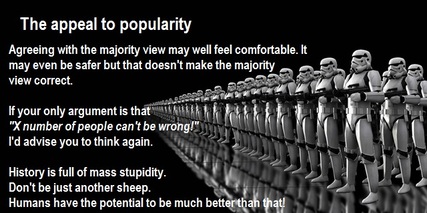
One famous example of this was George W Bush when he declared in September 2001 that “either you are with us, or you are with the terrorists":

The false dichotomy remains a popular fallacy to utilise because it sounds dramatic and presents listeners with a stark choice (especially if accompanied with a reduction ad absurdum) that will only really offer one way forward. As philosophers and ethicists we need to be alert to its usage!
“You either have Euthanasia, which allows people to die pain-free and with dignity, or you have no Euthanasia and everyone suffers intolerably and with a total loss of dignity” (Pro-Choice)
“If you allow Euthanasia then everyone will be killed as soon as they become terminally ill or over 70 years old – all valuing of life will be lost. Whereas, without a Euthanasia law the terminally ill are cherished and valued by society – which would you rather have?” (Pro-life)
So, See if you can spot a false dichotomy this week!









 RSS Feed
RSS Feed
